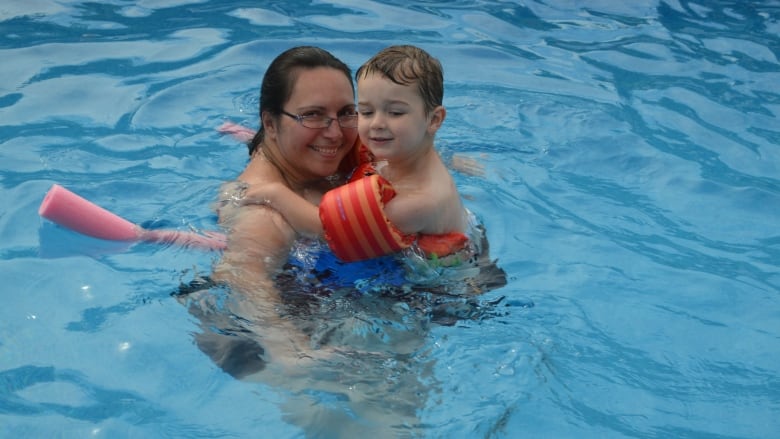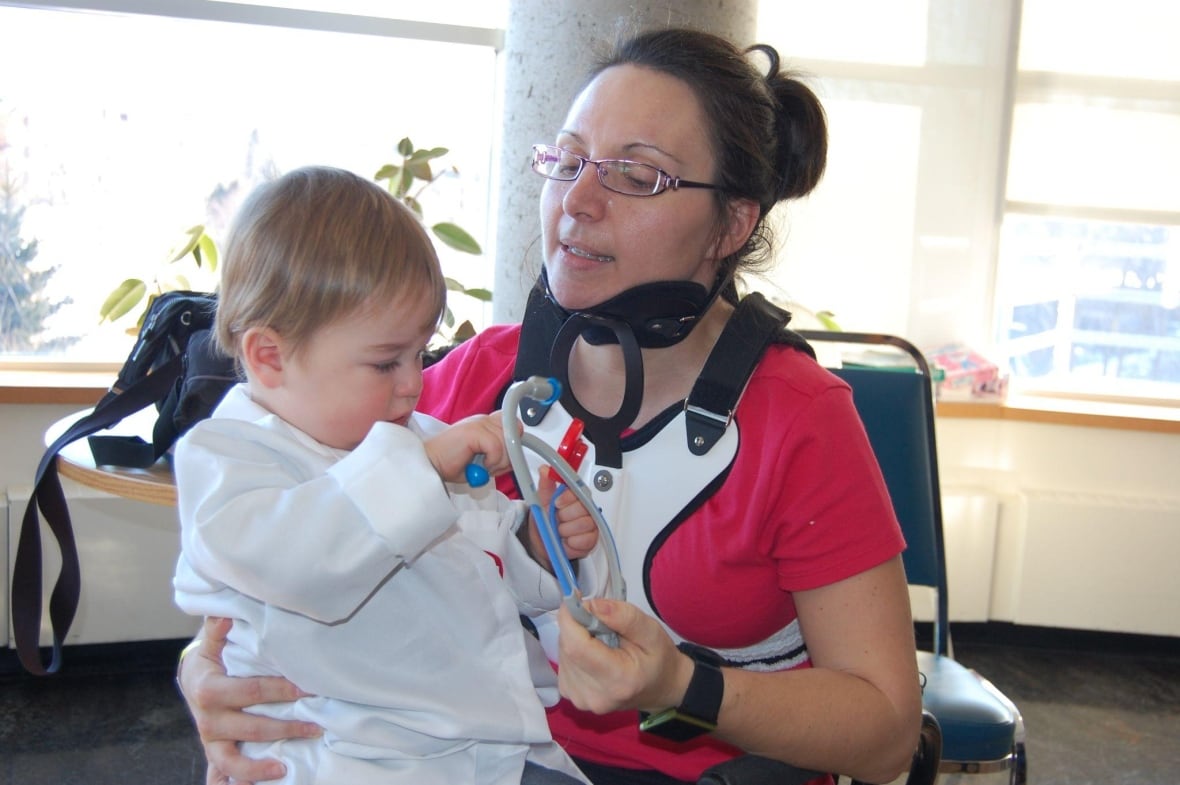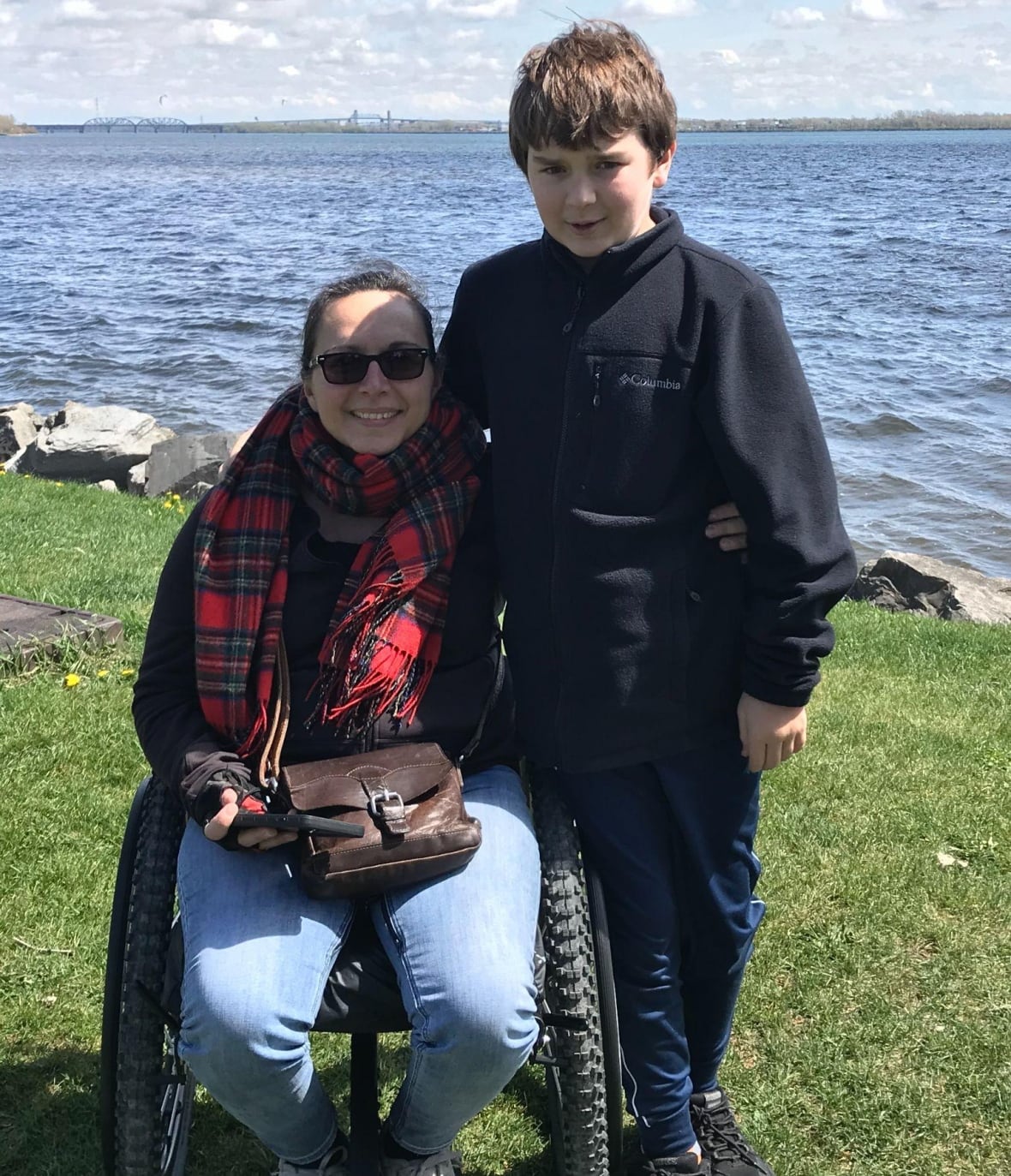The barriers, both physical and social, I face as a parent living with a disability
If it wasn’t for my stubbornness, my son and I would be left behind.

Marjorie and her son, Thomas, are seen swimming together when he was five years old. When he was a toddler learning how to swim, Marjorie needed some extra help ensuring Thomas was safe during his lessons. Marjorie Aunos photo
Marjorie Aunos, CBC Montréal • First Person June 04, 2021
| This First Person article is the experience of Marjorie Aunos, a psychologist in Montréal. For more information about CBC’s First Person stories, please see the FAQ. |
I dreamt of being a mom for years. When I would close my eyes, thinking of how it could be, I could literally feel him in my arms. My journey toward parenthood was done on my own, with a community of family and friends around me. Even before my son, Thomas, was born in 2010, I knew he would always come first and I longed for all those parent-child activities we would do together, like those mom and tots swimming lessons.
When Thomas and I enrolled in those lessons at the public pool near our house, there was a sacred rule. Only the parents who were meant to go in the pool were allowed to enter the pool area. All the other parents needed to stay away, behind the glass doors. But I felt it was different for me. I was the mom. But for me to go in, another adult needed to be there with us to hold him steady.
Everyone knew it. It was only logical, and safer. The lifeguards knew and the other parents saw this was not something I could do on my own. Yet, every week, I had to justify, bargain, explain and sometimes get angry.
And every week, I had to face everyone’s stares.

Marjorie injured her spinal cord in a car accident in 2012, when Thomas was 16 months old. Marjorie Aunos photo
To be able to take part in those lessons, I had to slide down from my wheelchair, using my arms to direct my buttocks to drop on the side. I had to prevent my whole body from falling to the ground. The whole endeavour needed to be done carefully, as to not bruise any body parts. Then I learned to crawl in a seated position until the lower part of my legs were in the water. A swift turn and I would end on my belly on the side of the pool, a position from where I could slowly slide the upper part of my body into the water.
Once submerged, I could easily float and move my arms around in a co-ordinated fashion to get to where my son was: in my mother’s arms. He was ready to learn to float, ready to put his head under water. And I was there to be a part of it.
I could feel the envy in all those stares. In a way, it wasn’t fair that both my mom and I would get to experience his first swimming moves. But I wouldn’t have missed these moments for anything in the world.
What few people knew, though, is that getting in the water was the easy part. After the swim, I had to do it all in reverse, while being wet and working against gravity. This was how much I wanted to stay involved. I wanted to continue being his mommy, to fulfill all of those dreams I had while pregnant. I needed him to know that he came first. That time in the pool brought me joy; it made him laugh and sometimes cry out of fear as water splashed on his face.
In those moments, I wanted to be the one he could reach out to for comfort.
I felt like I deserved to take part in everything Thomas was doing, that he deserved to have an over-involved parent like all the other kids around him. I had survived the car accident a few months prior to do just that. Just like any other parent, I had imagined going to the park, playing in the sand, sliding with my child. I had imagined myself attending parent-teacher conferences, borrowing books at the library, bringing him to hockey on Sunday mornings with my Timmie’s in my hand.

‘If it hadn’t been for my stubbornness and for my strong belief that I, like every other parent with or without a disability, deserve to be included, I would have been left behind.’ Marjorie Aunos photo
Never had I imagined I would need to check if I could access these community buildings. Never had I thought I would need to be in constant solution-finding mode when these buildings did not offer a way for my wheels to get in. If it wasn’t the dressing rooms that were too small, it was a lack of adapted toilets. I saw handicapped parking spaces that were used to dump snow, used by city employees or not wide enough for my vehicle.
When it was time to find a school for Thomas, I had to send my mom as my scout as I couldn’t enter most of them due to stairs. When I finally picked one, the only school in my neighborhood into which I could enter, I was not allowed to drive down the cul-de-sac — closed during school hours — leading to the school gates. If I wanted to drop my son off, I had to use one of the neighbourhood’s busiest streets, or ask a stranger to bring him up to the gate in my place.
My accident was a terrible thing that happened to me, but unfortunately it wasn’t the worst. The worst was having to learn to navigate in a world that too often leaves people like me behind.
Being in a wheelchair allows me to move around. It allows me to get places. But I can assure you that if it hadn’t been for my stubbornness and for my strong belief that I, like every other parent with or without a disability, deserve to be included, I would have been left behind. Numerous times. And my son would have missed out from having a cheerleader mom.
| CBC Québec welcomes your pitches for First Person essays. Please email povquebec@cbc.ca for details. |
| ABOUT THE AUTHOR |
| Marjorie Aunos, PhD is a psychologist, inspirational speaker, author and researcher from Montréal. Her expertise is working with parents who have intellectual disabilities. In 2012, she sustained a spinal cord injury in a car accident. Mother to a 16-month-old at the time, the accident and subsequent injury gave her an interesting perspective on parenting and disability. Marjorie believes that focusing on our strengths of character can lead to living a fulfilling life. With her family she learned to be a solution-finder to make her world more accessible. Follow Marjorie on Instagram @ninjamarj Twitter @ninja_marj and Facebook ninjamarj |
![]() Source CBC Montréal · First Person
Source CBC Montréal · First Person
Also see
Post-pandemic world must be more inclusive, offer more supports for those living with disabilities CBC
The ‘crip tax’: Everything has a cost, but for people with disabilities that’s quite literally the case CBC
